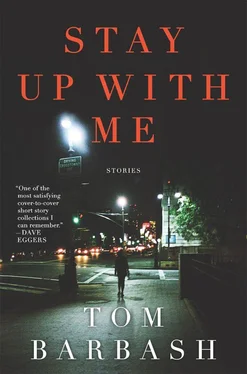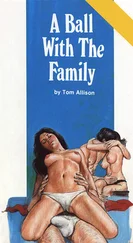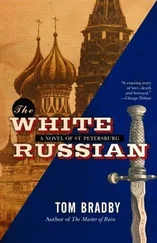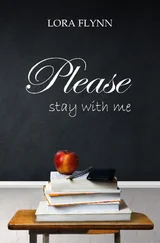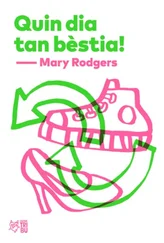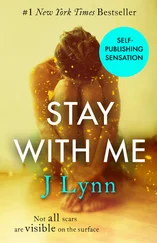“She will have the whole summer as her deadline,” I said, and the dean nodded grimly, and somewhat paternally. I wondered if he had more to say, but he didn’t and without further incident took his leave.
That night as I parked my car and sat outside my house, I thought about how distant Rajiv and I had become. How much I’d wanted everything to be different. He was a gifted boy. Bold in ways I once was. I was immensely proud of him, so much that I imagined he’d written something he might not yet be capable of. Perhaps it was my vanity that screwed all of this up. It would be untrue to say that I never looked at Rachel in the wrong way. And even now a part of me hopes that I’ll see her in her towel leaving the shower, her damp hair falling lushly down her back. It reminds me of a period in my life in which I wouldn’t have cared what my own father said or thought. I would have done what I wanted in the name of love.
W e sat on the screened-in porch of my new family’s summerhouse, passing bottles of red wine and telling death stories. I was twelve and wasn’t drinking.
Charles had a friend whose cousin lost his ear to a wolf, then froze in a blizzard. He’d been spring camping on Mount Hood in Oregon and hadn’t planned for snow.
“He was iced solid… curled up like a fetus,” Charles said. “Took them four days to find him. He bandaged that poor ear to his head with a handkerchief and duct tape.”
“I know that mountain. You can’t trust it,” Walt said. He was puffy and pale in the candlelight and expertly rolled his own cigarette as he spoke. Behind him a hundred yards away, I saw a single lit window in the house’s back wing where I guessed my mother and their father, Norman, were having a late supper alone, away from us.
Deborah said when she was ten, she watched camp counselors pull a drowned girl from a lake in Switzerland. The girl had slipped out of sight, away from the roped-in swimming area, and she’d hit her head against a rock.
“They gave her mouth-to-mouth, but looking at her you can tell she was gone,” Deborah said. She dipped her finger into a pool of wax at the candle’s base and then let the hot liquid slide across her palm before hardening.
“That was the only dead body I ever saw,” she said, and she spoke toward me. Everyone else, I guessed, had heard this before. “I kept thinking ‘That could have been me.’ Absolutely.”
Walt said he saw a football player sever his spine during a game; the boy never heard the linebacker behind him. And on Nan’s way onto a train in Calcutta, she said, she nearly tripped over a corpse before realizing what it was.
At my turn, I told them about watching my brother die in a car accident. He was thirteen years old at the time and I was nine.
“My mother was driving home from the lake and I kicked a pile of tennis balls around her seat to the front,” I said. “They rolled beneath her feet and she smashed the car.”
I told them more, about the ride to the hospital, and the waiting: the dismal yellow waiting room, my mother on a separate bench, rubbing her hands over her pant legs rocking forward and back, lips moving, blaming me, I thought. She’s never stated this, but even now, twenty-two years later, I can’t see how she wouldn’t want to shift the burden. How she wouldn’t tell herself she was driving safely and nothing would have happened had I followed the car rules. I would understand that.
“Shit, Lou,” Walt said. “No one told us. No one said a thing.”
They stared over as if a person had taken my place on the porch. Nan reached her arm around me and held me tight. No one asked me anything else.
That was the summer Mother and Norman had decided to test us all as a family: four weeks in Norman’s summer home off the coast of Maine. He and my mother weren’t officially engaged, but the subject was in the air.
My new brothers and sisters were in college or older; I didn’t know their ages exactly, but again and again I’d heard about their lives. In the stories my mother told, they soared untethered, like people in magazines or movies. They weren’t like anyone I knew. They’d driven motorcycles in foreign countries, won grants and awards, performed onstage or in the living rooms of glamorous apartments. My mother saved newspaper clippings about them. “They’re all creative,” she said on the trip from Auburn, New York, to Maine. She spoke as though they were already hers.
“Charles is the painter. Remember?” she said. “He had a show of some sort in SoHo? I told you about it. Nan’s the sculptor; Walt plays in the jazz band. Deborah is the actress; she’s been in two films.”
Deborah had a small role in a movie we saw last Christmas, my mother said. The closest one to my age, Lauren, was studying in France. As an artist, she hadn’t defined herself, my mother said, “But she writes nicely. Like you, she’s got a good sense for people.”
In Lauren’s room, where they put me, there were piles of letters, diaries, and typed short stories, “The One-Eyed Jack,” “Lantern Night,” “Late Show,” “The Tall Man with the Purple Felt Hat.” Mostly, though, there were pictures. They lined shelves, covered corkboard: collages of the family in faded beachwear or thick, wooly sweaters, heads gazing forward over their folded arms, wild hair whipping back in the wind, on the boats, on the beaches, groups of them touring museums, walking narrow city streets, picking mussels in the fog. I tried to imagine my mother and me in those scenes on the walls. I felt as if something had passed us by.
Lauren’s bedcovers were white goose down and the floors were dark lacquered wood. On the blue night table was a photo album with handwritten captions about people. “Me and Nan in Paris,” “Charles after the ski trip…” “Bongs Away!”
When the house was empty, I dug around like an archaeologist. I raked over the CDs, the photo albums stacked in the corners, and flipped through the yearbooks, reading the inscriptions. On a bureau top there were pictures of Lauren in shorts and in a bathing suit, her legs tawny and long. It was strange to think of her as a relative; I looked at pictures of my new sister and I was hypnotized. It didn’t feel right and in many ways I was glad she wasn’t with us that month. I didn’t know how I would act. It’s a funny thing to meet a group of people older than you and be told that they are your family, you will live with them and not hate them or ignore them or fall in love with them. I stayed up late one night studying Lauren’s clothes and desk drawers and books. I found her diary and I read a few pages. What I read embarrassed me; it was about her and a boy in a field at night. I looked at her in a photograph and then at the boy in her album. I imagined them behind some trees in a darkened glen. I searched through her clothes for what she might have worn that night and settled on a thick gray sweatshirt, crossed oars on the chest, paint and grass stains flecked across the back. I threw it in my bag under my windbreaker.
For a while after my brother, Tim, died, my mother slept in his room, in his bed with the Buffalo Bills sheets. She kept his posters and papers and model warplanes intact. About a year later she moved back into her own bedroom and began throwing those things out. She swept through the house like a wind, cleaning, clearing, and rearranging. She said crisis was something you could turn around, you could make something positive out of it.
One time, while I was asleep, she put all our photo albums and my brother’s things in cardboard crates and carried them to the curb. She pulled the curtains from the window in his room, so sun would shine in always. She made the room her den. She went back to school for her master’s degree. She rode her bike to class and carried her book bag over her shoulders. In addition she took yoga, then tai chi. Early mornings when I looked out the window, I could see my mother crouching low, arms leveling out as if sliding across an imperceptible surface. She’d spend hours in the attic sculpting naked figurines, and then she painted our house with the same energy, inside and out.
Читать дальше
